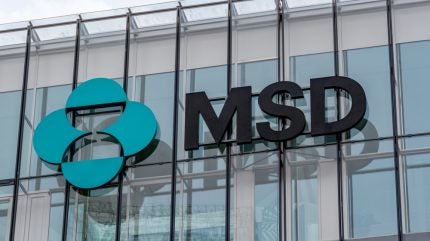
Merck & Co (MSD) has joined fellow big pharma companies in looking to redirect cash, as the drugmaker revealed plans to save $3bn annually by the end of 2027.
Announcing the initiative in its Q2 report, MSD said the savings would be reinvested into “strategic growth areas”. The US company did not reveal how it could cut costs – strategies often employed by pharma companies include reducing headcount, selling assets or trimming pipeline projects, and shutting down facilities.

Discover B2B Marketing That Performs
Combine business intelligence and editorial excellence to reach engaged professionals across 36 leading media platforms.
A conference call on 29 July offered few answers, though chief financial officer Caroline Litchfield confirmed that the plan “will impact the R&D line”.
Total global sales for the company were $15.8bn in Q2 2025, a year-on-year decrease of 2%. Alongside the cost-cutting measures, MSD confirmed it slashed its 2025 projections, down from a range of $64.1bn-$65.6bn to $64.3bn-$65.3bn.
Shares in US-listed MSD dropped 5% at market open to a price of $79.85 on 29 July compared to the pre-announcement market close the day prior. The pharma company has a market cap of $203.1bn.
MSD did not shy away as to why the billion-dollar savings are needed.

US Tariffs are shifting - will you react or anticipate?
Don’t let policy changes catch you off guard. Stay proactive with real-time data and expert analysis.
By GlobalDataSales of the drugmaker’s human papillomavirus (HPV) vaccine range Gardasil have been hit hard in China, suffering a slump of 55% compared to Q2 last year. Gardasil’s $1.1bn of sales brought MSD’s revenue down by nine percentage points compared to the same period last year.
In the Q2 earnings call, Litchfield commented that due to the soft demand, MSD will not resume shipments until at least the end of 2025. Elsewhere in Asia, the company expects headwind in Japan’s Gardasil sales to impact H2 growth.
The elephant in the room for MSD is the looming patent expiry for blockbuster drug Keytruda (pembrolizumab). Keytruda is the best-selling drug in the world, notching sales of $29.5bn in 2024.
Sales for the cancer drug grew 9% in Q2 on the back of further indication approvals – its $8bn in sales accounted for more than half of the company’s revenue. However, the upcoming loss of exclusivity for Keytruda is expected to significantly impact the company’s outlook. With biosimilars projected to enter the market by 2028, revenues from the branded drug are likely to face sharp declines – consistent with historical trends.
MSD CEO Rob Davis said: “The multiyear optimisation initiative that will redirect investment and resources from more mature areas of our business to our burgeoning array of new growth drivers, further enable the transformation of our portfolio, and drive our next chapter of productive, innovation-driven growth.”
The unveiling of the plan comes less than a month after MSD outlaid $10bn to acquire Verona Pharmaceuticals, a deal that the former reiterated as a major growth driver during the conference call. The buyout will see MSD pick up Ohtuvayre (ensifentrine), a drug which analysts describe as a potential blockbuster drug for COPD treatment.
MSD has joined a list of big pharma companies targeting cost savings. Pfizer and BMS both have programmes set to save $1.5bn and $2bn, respectively, by 2027. Takeda and Bayer have also initiated restructuring, including a drop in headcounts over the past couple of years.




